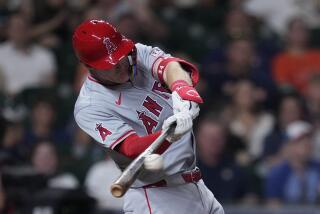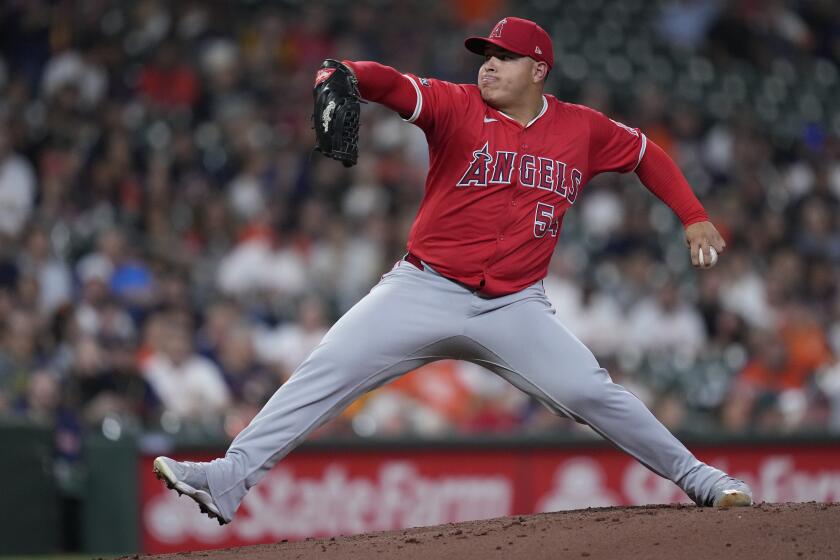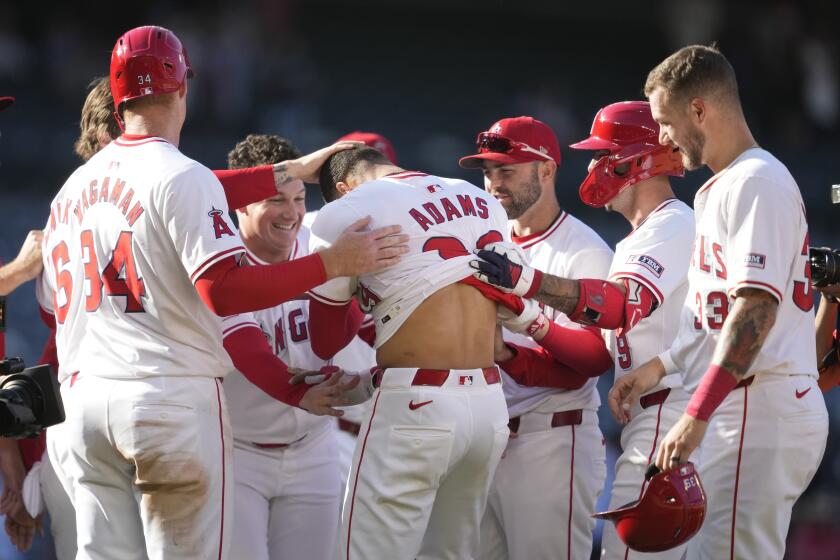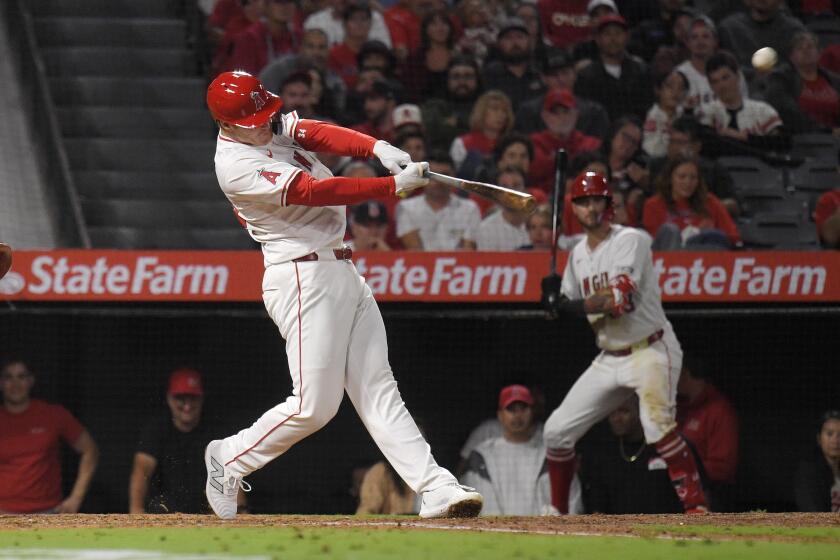Finally, He Sticks : Angels’ Lovullo Hits After Blowing Several Major League Trials
Sure, he’s being paid to play a child’s game. But anyone who has ever choked under pressure can identify with Torey Lovullo.
Anyone who after years of toiling has gotten that promotion, only to fail miserably.
The worst part is realizing there is no one to blame but yourself. Lovullo handled failure in 1989 by often sleeping until 1 p.m.--the shorter the day, the easier to deal with a baseball season gone sour.
For the first time in a career that began when he rewrote record books at Montclair Prep and UCLA, Lovullo could not hit.
There was seemingly no end to his unfamiliar futility.
Certainly, the .283 batting average he woke up with this morning did not seem possible four years ago.
Back then, Lovullo’s dad, Sam, telephoned him every night, offering consoling words as Torey went 0 for 20.
After striking out 20 times during a 10 for 87 (.115) slump, Lovullo spun into a black hole, landing in Toledo, 45 miles down Highway 24 from Detroit, but a galaxy away from the major leagues.
It was a free fall for the Tigers’ switch-hitting first baseman. Detroit Manager Sparky Anderson was so sure of Lovullo’s talent, he vowed: “I’ll die before he comes out of the lineup.”
Instead, Anderson returned, unexpectedly, to his Thousand Oaks home for a 17-day rest while Lovullo tried to pick up the pieces with the Toledo Mud Hens.
Lovullo’s wife, Lynn, tried to convince her husband that the road to the big leagues is filled with bumps, potholes and downhill grades.
“All I saw was that I wasn’t getting base hits,” Lovullo said. “She said, ‘You’ll be a better player because of this.’ ”
Flashing forward, perhaps Lynn Lovullo could hear ESPN’s highlights from Anaheim Stadium on April 25, 1993:
. . . Torey Lovullo takes Roger Clemens out of the park in a 2-1 win over the Boston Red Sox, becoming the first Angel to homer off Clemens since May 16, 1989.
In 1990, Lovullo, then 24, dug himself out of the black hole. He hit .270 for the triple-A Mud Hens with 38 doubles, 58 runs batted in and 14 home runs.
But he was persona non grata in the Tigers’ organization and on March 19, 1991, was traded to the New York Yankees for pitcher Mark Leiter.
Given a second, albeit brief chance to prove himself at the major-league level, Lovullo struggled again. A now familiar pressure mounted as he went hitless in his first 13 at-bats.
The Yankees ran out of patience and sent him back to the triple-A proving ground he had already conquered.
“I thought, ‘What is it gonna take?’ ” Lovullo said. “What am I doing wrong?”
Though twice he failed to hit at the major league level, it never crossed Lovullo’s mind to pack his gear and find a use for his social psychology degree.
“I knew in my heart--I mean here’s a total success story, but I’m not really lying to you, this is the truth . . . ,” Lovullo said. “I knew in my heart that I was good enough to play in this league.
“And I was gonna battle my tail off to prove that to somebody. I never lost hope and I knew that an opportunity would come.”
Between two brief stints for the Yankees for whom he hit .176 (nine for 51), Lovullo started from scratch with the help of Rick Down, manager of the triple-A Columbus (Ohio) Clippers.
Down revamped Lovullo’s swing, teaching him to hit to the opposite field and Lovullo rewarded Down’s confidence in him by hitting .272 with 75 RBIs and 10 home runs. The Yankees’ reward was a paltry five at-bats at spring training in 1992. When camp broke, Lovullo was a Columbus Clipper again.
Flashing forward, he could only dream of a newspaper article like the one that appeared June 5, 1993:
DETROIT--Torey Lovullo’s run-scoring single triggered a three-run Angels’ rally en route to a 6-3 victory over the Tigers.
“That was, by far, the biggest RBI I’ve ever had,” Lovullo said. “I wanted to do well, not to put it in their face, but I wanted Sparky (Anderson) to see that I was a player. And I wanted the fans to see the real Torey Lovullo.”
Lovullo batted .295 in 1992 with 89 RBIs and 19 home runs for Columbus, but his name was never among those called up by the Yankees.
“I was a frustrated player,” Lovullo said. “I can’t imagine what more I had to do to get to that level.”
A log jam of infielders in New York (Don Mattingly, Charlie Hayes, Randy Velarde, Mike Gallego, Pat Kelly and Andy Stankiewicz) kept Lovullo in the minors. Although he hit in 17 consecutive games in August, the Yankees did not call him up in September when major league rosters expanded.
He was denied the cup-of-coffee call up, an automatic reward for the best triple-A players.
“I saw the hand writing on the wall,” Lovullo said. “I thought, ‘Forget you guys. You didn’t call me up. That’s fine--I’m outta here.’ ”
As a sixth-year pro, Lovullo was granted free agency, enabling his agent, Dennis Gilbert, to negotiate with every major league team. After talks with representatives from Cleveland, Colorado, Pittsburgh and California, Lovullo signed with the Angels.
Anaheim’s proximity to his Northridge home and general manager Whitey Herzog’s belief in Lovullo’s abilities were the determining factors.
“Dennis and Whitey were the two people who believed in me and paved my way,” Lovullo said. “Nobody else thought I had a chance. I was a guy who didn’t succeed on two teams.”
Lovullo credits teammate J.T. Snow for helping him gain Herzog’s attention. Prior to the trade that sent Jim Abbott to the Yankees for Snow, Russ Springer and Jerry Nielsen, Herzog scouted Snow and Springer in Columbus and couldn’t help noticing Lovullo.
“I think I rode J.T.’s coattails from New York to California,” Lovullo said.
Although he signed for the major-league minimum ($107,000), there was no guarantee Lovullo would make the Angels’ roster.
“It’s funny how players respond,” Lovullo said. “The Angels believed in me and I felt wanted here. In that atmosphere, it is easier to play.”
As a replacement for a slew of injured starters, Lovullo has appeared in 45 of 72 games. He has made only six errors despite attempting to master four positions, primarily second base and third base.
As a pinch-hitter, he is four for eight, including a home run and three RBIs.
“It’s kind of mind-boggling,” Lovullo admitted.
Angels’ hitting instructor Rod Carew has played a major role.
“Here’s a guy who takes time out during the day to throw countless pitches, hour after hour,” Lovullo said. “He’s shown me the mental aspect of hitting. He likes to tell me what to expect in a situation, whether I haven’t played in a week or if I’m playing that night.
Said Carew: “I try to get him to drive the ball early in the count. You can ask him to try something new and he will because he’s looking for that extra edge.
“He had a good spring so the thing I told him to do was stay within himself. If he’s trying to impress anyone, it turns sour. He’s got to please himself first before anyone else can be satisfied.”
Lovullo always seemed bound for some kind of glory. He led Montclair Prep to Southern Section small schools championships in 1981 and ’82 and earned a place in the Southern Section record book as the all-time leader in runs (142 from 1980-83).
At UCLA, he set more than a dozen records, including career marks for hits (266), home runs (51), RBIs (188), runs (211) and total bases (476).
Just 1 1/2 years after being selected co-player of the year in the Pacific 10 Conference for the second time, Lovullo made his major-league debut for the Tigers, going eight for 21 (.381) at the end of the 1988 season.
That prompted Anderson’s bold proclamations, followed by Lovullo’s failure, his comeback, his struggle with the Yankees, two more seasons in triple A, and finally--success.
Torey Lovullo’s Statistics
Year Team (Class) AB R H BI HR SB Avg. 1987 Fayetteville (A) 191 34 49 32 8 5 .257 1987 Lakeland (A) 60 11 16 16 1 0 .267 1988 Glenn Falls (AA) 270 37 74 50 9 2 .274 1988 Toledo (AAA) 177 18 41 20 5 2 .232 1988 Detroit (AL) 21 2 8 2 1 0 .381 1989 Detroit (AL) 87 8 10 4 1 0 .115 1989 Toledo (AAA) 409 48 94 52 10 2 .230 1990 Toledo (AAA) 486 71 131 58 14 4 .270 1991 Columbus (AAA) 395 74 107 75 10 4 .272 1991 New York (AL) 51 0 9 2 0 0 .176 1992 Columbus (AAA) 468 69 138 89 19 9 .295 1993 Angels* (AL) 145 19 41 17 3 3 .283 ML Totals* 304 29 68 24 5 3 .224
* Through Saturday
More to Read
Go beyond the scoreboard
Get the latest on L.A.'s teams in the daily Sports Report newsletter.
You may occasionally receive promotional content from the Los Angeles Times.




